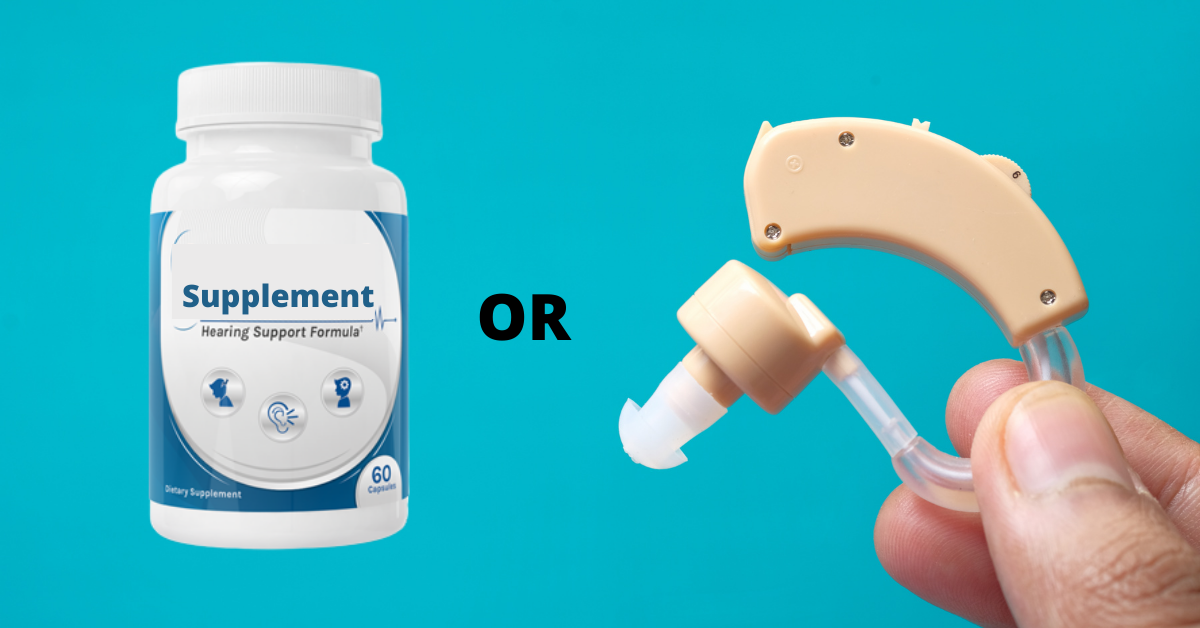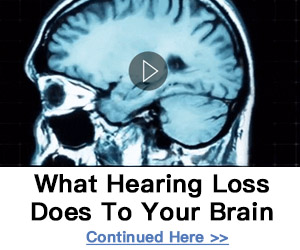
A hearing loss can occur when any part of the ear or auditory (hearing) system stops working normally. The hearing loss treatment depends on what’s causing it. Sometimes it gets better on its own or can be treated with brain and hearing support supplements, medicines, or a simple procedure.
Hearing loss can be temporary or permanent. It sometimes develops gradually (presbycusis) as you get older, but it can occur suddenly as well.
In the United States, about half the people who are older than 65 years have some degree of hearing loss.
Hearing loss treatment options may include:
- Brain and hearing support supplements
- Removing the wax blockage
- Surgical procedures
- Use of hearing aids
- Cochlear implants
- Auditory brainstem implants
Before starting the hearing loss treatment, one must understand the basics. This allows you to diagnose the exact type of hearing loss that is affecting you.
If you want to go straight to the topic, click here.
Hearing Loss Causes
Hearing loss is caused by several different factors. These include conditions like idiopathic, hereditary, acquired, or refractive ear damage, which may result in different ear diseases leading to hearing loss.
Hearing loss can be due to the degeneration of the inner ear structure. It is often due to problems with the cochlea, the main part of the inner ear, where the hair cells, which convert sound into nerve signals, are located.
In the ears, hair cells are the sensory receptors of the auditory system and the vestibular system.
Also, hearing loss may be due to loss of the hair cells and the cells’ ability to turn sound into nerve signals, loss of the nerves, or damage in the way the nerves connect to the brain.
When your hearing is so bad that you experience dizziness, hissing, clicking, and other sounds, you might need a hearing aid or an assistive listening device.
And sometimes a hearing loss can occur from the condition called tinnitus (ringing in the ears).

Medicines That Cause Hearing Loss
Hearing Loss Signs and Symptoms
Early signs of hearing loss include:
- Difficulty hearing other people clearly, especially in noisy places
- Asking people to repeat what they said
- Listening to music or watching TV with the volume higher than normal
- Difficulty hearing on the phone
- Finding it hard to keep up with a conversation
- Feeling tired or stressed from having to concentrate while listening
Signs of hearing loss in children
Signs of hearing loss in children include:
- If they are slow to learn to talk
- They are not clear when they speak
- Your child does not reply when you call
- If they talk very loudly
- They ask you to repeat yourself
- They respond inappropriately to questions
- Your child turns up the volume of the TV very high
See your doctor if experience any of the symptoms in your child’s hearing.
Hearing loss occurs in children because of a build-up of fluid in the ear (glue ear), which tends to get better over time and can be treated.

Signs of hearing loss in babies
After birth, babies have a hearing check. This is conducted in the first few weeks. You should speak to your health practitioner if you think they might have difficulty hearing.
Signs of hearing loss in babies include:
- Your baby is not startled by a loud noise
- Baby seems to hear some sounds, but not all others
- They notice you when they see you, but they don’t respond when you call their name
- They do not turn towards voices by 4 months of age
- Your baby has not started to say any recognizable words by around 15 months
Types of Hearing Loss
There are four types of hearing loss:
Conductive Hearing Loss
Conductive hearing loss occurs when something stops sounds cannot get through the outer or middle ear. Treatment option for conductive hearing loss includes medicines or surgery.
Sensorineural Hearing Loss or SNHL
Sensorineural hearing loss occurs when the inner ear structure or auditory nerves are damaged.

Mixed Hearing Loss
This type of hearing loss includes both the elements of conductive and sensorineural hearing loss.
Auditory Neuropathy Spectrum Disorder or ANSD
In this type of hearing loss, sound enters the ear normally but has a problem sending it to the brain. This is because of the damage to the inner ear or the hearing nerve. The sound is not organized in a way that the brain can understand. More details can be obtained from here National Institute of Deafness and Other Communication Disorders
How Hearing Loss Affects your Life?
How hearing loss affects your life depends on the severity and type of hearing loss you have. It can restrict you from performing certain activities of daily living and also affects your ability to understand what the other person is saying. This badly affects your communication abilities with others.
How to Prevent Hearing Loss?
Here are 5 ways to prevent hearing loss:
- Use brain and hearing support supplements
- Avoid loud noises.
- When listening to music, make sure you adjust the volume that suits your hearing power. Do not exceed.
- During loud events and activities, protect your hearing.
- At work, you should take precautions, especially if you are working in an industry where machines make loud noises.
- Get your hearing tested regularly, especially if you are above 65 years of age.
What Hearing Loss Does To Your Brain
There are certain pieces of evidence that if the hearing loss treatment is not carried out it affects your brain parts. This leads to auditory deprivation that happens when your mind is deprived of sound, corresponding to untreated hearing loss.
Over time, your mind loses the power to process sound. If left untreated, the components of the brain are usually liable for listening to get “reassigned” to different tasks. These components additionally are likely to shrink or atrophy.
In a study conducted at Johns Hopkins Hospital, experts found that that mild hearing loss doubled the risk of dementia.

The research continued for nearly 12 years and included 639 adults, led by Frank Lin, M.D., Ph.D., and his colleagues.
“Brain scans show us that hearing loss may contribute to a faster rate of atrophy in the brain,” Lin says. “Hearing loss also contributes to social isolation. You may not want to be with people as much, and when you are you may not engage in conversation as much. These factors may contribute to dementia.”
So, are hearing loss and dementia related? Yes, the study conducted at Johns Hopkins suggests that hearing loss and dementia are related to each other.
Hearing Loss Treatment Options
A hearing loss is a common condition, affecting nearly half of adults aged 65 or older. By the time they reach their senior years, many Americans have trouble hearing. Many of these people need hearing aids to compensate for the loss.
Hearing loss can be the result of several causes, ranging from high noise levels to an age-related decline in hearing.
For starters, it’s a good idea to determine what you need to do to keep up with the hearing demands of everyday life.
Hearing loss can be cured by using several different treatment options. Here are 6 of the best hearing loss treatment options to help you fight back:
Hearing Loss Medicines & Supplements
Unfortunately, there are no overnight magic pills that will eliminate or reverse your hearing loss in a day or two. This takes a little bit of time to reverse if you use hearing loss supplements as a preferred hearing loss treatment.
However, if you make sure you are taking all the brain and hearing support supplements, vitamins, minerals, and enzymes your body needs to support blood flow, brain function, mitochondrial function, and production of its own antioxidants, this will go far in protecting your hearing.

- Magnesium
- Coenzyme Q10
- N-acetyl cysteine
- Lipoic Acid
- Vitamin C
- Vitamin B6
- Folate
- Potassium
- Hibiscus
- Garlic bulb extract
- Hawthorn
- Rosemary
Removing Wax Blockage
Removing wax from the ear is one of the simplest forms of hearing loss treatment. Sometimes your ear develops earwax causing blockage due to which hearing loss occurs. Your doctor may remove earwax using a small tool with a loop on the end. The doctor may use a suction device to clear stubborn earwax.
Surgical Procedures
Some types of hearing loss treatment require surgery. If you have abnormalities of the eardrum or bones of hearing (ossicles), your doctor may suggest surgery. This depends on the type of hearing loss you have. Here are some considerations:
- If you have sensorineural hearing loss, Cochlear implants may be suggested by your doctor
- Baha® Bone Conduction Implants – This is recommended for single-sided deafness, conductive hearing loss, and mixed conductive and sensorineural hearing loss.
- If you have conductive hearing loss, your doctor may recommend PE Tubes, Stapedectomy, Middle Ear Surgeries, and BAHA.
Hearing Aids
A hearing aid is a small electronic device that makes sounds louder and clearer. Although it cannot return your full hearing as before, it will not put more burden on your ear.
If your doctor suggests you this type of hearing loss treatment, make a note that there are different types of hearing aids available such as:
- Behind the ear hearing aids – These are the most common type of hearing aids. It goes around the top and back of the ear.
- In the ear hearing aids – These types of hearing aids are small in size and fit in the opening of the ear.
- In the canal hearing aids – These are very small in size hearing aids. These can be fitted a bit further into the opening of the ear, so they’re just visible.
If you need a hearing aid, your doctor will suggest the best one based on your condition.
Cochlear Implants
The Cochlear implant is a surgically implanted medical device. It is used to help some people with hearing loss by increasing the ability to hear, improving communications, and producing a better quality of life.
In this hearing loss treatment, Cochlear implants are surgically placed inside the skull to boost the nerve signals from the brain to the inner ear.
Each person’s hearing loss and what works best for them will depend on several things, including age, speech, sound density, type of hearing loss, physical conditions, and any underlying health problems.
If your conventional hearing aids do not work as expected, this means you have a more severe hearing loss. In this condition, a cochlear implant may be an option for you.
Unlike a hearing aid, a cochlear implant bypasses damaged or nonworking parts of your inner ear and directly stimulates the hearing nerve.
In Summary
More than seven million American adults have disabling hearing loss and more than 300 million people worldwide. Although you might not want to hear it, your hearing could be declining, especially if you have a family history of hearing loss, have become more forgetful, or have trouble with language or concentration.
Hearing loss is caused by several different reasons. These may include different conditions like idiopathic, hereditary, acquired, or refractive ear damage, which may result in different ear diseases leading to temporary or permanent hearing loss.
The hearing loss treatment depends on the type of hearing loss you have. We have discussed all the types above clearly. Your doctor is the main person who suggests which hearing loss treatment option best fits you. You can also use brain and hearing support supplements that will not only cure your hearing loss problem but also will prevent it from occurring in the future.
ALSO READ:
The Amazing Benefits of Khichdi: A Rice and Lentil Dish That Is Super Healthy



